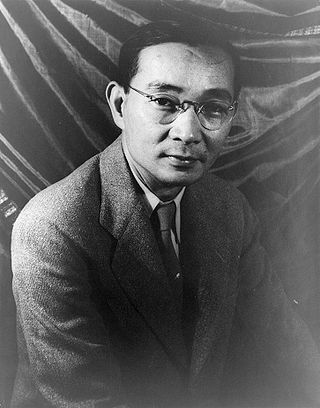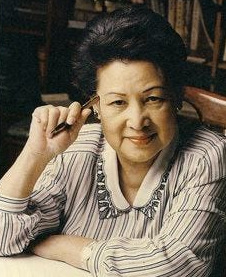
Lin Yutang was a Chinese inventor, linguist, novelist, philosopher, and translator. He had an informal style in both Chinese and English, and he made compilations and translations of the Chinese classics into English. Some of his writings criticized the racism and imperialism of the West.

Lin Haiyin was a Taiwanese writer and editor from a family in Miaoli County, Taiwan. She was born in Osaka, Japan, and lived in New Taipei City's Panchiao district until the age of four before relocating to Beijing. Lin worked as a journalist and editor for the World Journal (世界日報) in Beijing before moving back to Taiwan with her family in 1948. In Taiwan, she served as an editor for the Mandarin Daily News (國語日報) and as the editor of the United Daily News (聯合報) supplement. She is best known for her 1960 book Memories of Peking: South Side Stories (城南舊事), a novelistic tribute to her childhood reminiscences of Beijing.

The National Museum of Taiwan Literature is a museum located in Tainan, Taiwan. Operated by Taiwan's Ministry of Culture, the museum researches, catalogs, preserves, and exhibits literary artifacts, and is also the first national literature museum in Taiwan. As part of its multilingual, multi-ethnic focus, it holds a large collection of local works in Taiwanese, Japanese, Mandarin and Classical Chinese.

Chung Chao-cheng was a Taiwanese novelist and Hakka native born in the Hsinchu Prefecture during the Japanese rule period. Revered as the "Mother of Taiwanese Literature" in Taiwan, he is also frequently mentioned alongside Taiwanese writer Yeh Shih-tao, collectively known as "North Chung, South Yeh".

Yeh Shih-tao was a pioneering Taiwanese writer and historian spanning both the Japanese rule and post-war periods, who specialized in the literary history of Taiwan and the lives of ordinary Taiwanese people. His primary focus was on novels and critiques, supplemented by essays and translations, and was considered a seminal figure in Taiwanese literary criticism.

Yang Kui or Yō Ki, originally named Yang Kui (楊貴), was a Taiwanese writer and social activist born in Tainan, Taiwan. He used pen names such as Yang-kuei (楊逵), Yang Chien-wen (楊建文), Lai Chien-erh (賴健兒), Lin Ssu-wen (林泗文), and Ito Ryo.

Lu Ping, born in Kaohsiung in 1953, is a Taiwanese writer who writes under the pen name “Ping Lu”. Her writing encompasses a broad range of genres, including novels, essays, poems, commentary, and theater plays. She is also known in the Chinese-language world for her critique of social phenomenon, ranging from cultural development to gender issues and human rights. Over the past two decades, Ms. Lu has successfully established herself as a prominent novelist, columnist, and commentator in Taiwan.

Loa Ho, real name Loa Ho (賴河) and Lai Kuie-ho, pen name Lan Yun, Fu San, An Tu-shêng, Hui, Tsou Chieh-hsien, Kung I-Chi, Lang, etc., was a Taiwanese poet who was born in Changhua County, Taiwan Prefecture, Fujian-Taiwan Province, Qing dynasty. He was a medical doctor but was also a writer, poet, surgeon, and social activist from Changhua, Taiwan, having had enormous fame in literature. He founded the literature and arts column of The Taiwan Minpao and served as its editor-in-chief.

Li Kuei-hsien is a Taiwanese author, poet, cultural critic, translator, and inventor, born and raised in Taipei during the period of Japanese rule. He mainly writes poetry, but also provides reviews and translations.
Joyce Chi-Hui Liu is a Professor Emerita and Researcher/Director at the International Center for Cultural Studies at National Yang Ming Chiao Tung University, Taiwan. Her research focuses on geopolitics, biopolitics, border politics, internal coloniality, unequal citizenship, Asian modernity, Chinese political philosophy, and epistemic/artistic decolonization.
The Taipei Chinese PEN: A Quarterly Journal of Contemporary Chinese Literature from Taiwan, known as The Chinese PEN before 2007, is a quarterly English-language literary magazine on contemporary Taiwanese literature. The journal was founded by Nancy Ing in 1972, and published by the Taipei Chinese P.E.N. Center, one of the PEN International centers.
Chung Wai Literary Quarterly is a quarterly Taiwanese peer-reviewed scholarly journal publishing new and established poetries, fiction, academic journals, reviews, translations and non-fiction articles/essays, related to Western literature. Originally founded as a monthly literary magazine by Yen Yuan-shu and Chu Limin in 1972 and named Chung Wai Literary Monthly, the journal aims to encourage and promote critical and emerging approaches to non-local literatures and connect literature with other academic disciplines. It was widely regarded as a pioneering journal on comparative studies between Chinese and foreign literatures and had received numerous awards, including award from the National Central Library. The magnum opus of Taiwanese writer Wang Wen-hsing, Family Catastrophe, was also first published in Chung Wai. In 2007, the journal renamed and restructured as a quarterly and in 2019, the journal was recognized as a Grade I academic journal by the National Science and Technology Council of Taiwan.

Wei Ch'ing-tê, born in Hsinchu, Taiwan, with the courtesy name Jun An (潤庵) and pseudonyms Ai Ni Tzu (佁儗子) and Chih Tsun Yuan (尺寸園), was a journalist, writer, translator, and collector. He was honored as a poet laureate and his works have been compiled and published in eight volumes as The Complete Works of Wei Ch'ing-tê (魏清德全集) by the National Museum of Taiwan Literature.
Yeh Ti, originally named Yeh Chi-min (葉寄民), was a Taiwanese poet, translator, critic, and educator, hailing from Wanli in Tainan. He published poetry collections such as Purple Songs (紫色的歌) and Fire and Sea (火和海), a collection of essays titled Ukiyo-e (浮世繪), critical works like A Literary Tour of Taiwanese Literature (臺灣文學巡禮), and Essays on Early Modern Taiwanese Poets (臺灣早期現代詩人論), and translated more than ten works.
Chao Tien-yi, a native of Taichung city, was a Taiwanese poet, critic, and professor, using the pen name Liu Wen-che (柳文哲). He held positions such as professor and acting department chair at the Philosophy Department of National Taiwan University. Chao actively participated in literary societies like the Li Poetry Society, serving as the chief editor for publications such as Li Poetry (笠), Taiwan Literary Arts (臺灣文藝), Taiwan Veracity (臺灣春秋), and Man-tien-hsing (滿天星). He received numerous awards, including the Oxford Award for Taiwan Writers (臺灣文學家牛津獎).
Lin Chung-lung, also known by his pen name Lin Wai (林外), was a Taiwanese writer of children's literature. Born during the Japanese rule in today's Yangmei, Taoyuan, he graduated from the General Department of Taipei Normal School and served as an elementary, junior high, and high school teacher. He was described by Chung Chao-cheng as a versatile writer. In December 2016, the National Museum of Taiwan Literature published a 30-volume Complete Works of Lin Chung-lung (林鍾隆全集), the first complete works of a children's literature writer to be published in Taiwan.
The Taiwan Alliance for Literature and Arts was founded on May 6, 1934, as a private literary organization. The alliance brought together Taiwanese literary artists of various styles and schools at that time, with Chang Shen-chieh (張深切), Lai Ming-hung (賴明弘), Yang Kui (楊逵), and Loa Ho (賴和) as the leading writers. The alliance held activities throughout Taiwan and as far away as Tokyo, Japan. In addition to hosting literary lectures and forums and publishing art booklets in various places, it also published its official journal, the Taiwan-Bungei. The founding and activities of the association are seen by scholars as a shift from political movements to cultural resistance in the 1930s.
Taiwan PEN (臺灣筆會) is a Taiwanese literary organization founded on January 18, 1987. Its founding principles include ensuring creative freedom, promoting Taiwanese culture, and fostering international exchanges. The association is typically led by novelists or poets in rotation.
Chin Lien, originally named Chen Chin-lien, was a Taiwanese poet and translator from Changhua County, Taiwan. He spent his entire career working for Taiwan Railways Administration, and the railway became a significant motif for his thoughts and poetry, earning him the name of "Railway Poet." He also received several awards during his lifetime, including the Rong-Hou Poet Award of Taiwan (榮後臺灣人詩獎), the Oxford Prize for Taiwanese Writers (臺灣文學家牛津獎), the Li Poetry Society Translation Award (笠詩社翻譯獎), and the Taiwan New Literature Special Achievement Award.
The Taiwan Literature Awards is a nationally recognized literary award in Taiwan. Initially founded by the Council for Cultural Affairs of the Republic of China in 2001, it has been organized by the National Museum of Taiwan Literature since 2005. The award ceremony takes place annually, recognizing outstanding literary works in two major categories: "Taiwan Literature Awards for Books" for published books and "Taiwan Literature Awards for Original Works" to encourage writing in native languages.









